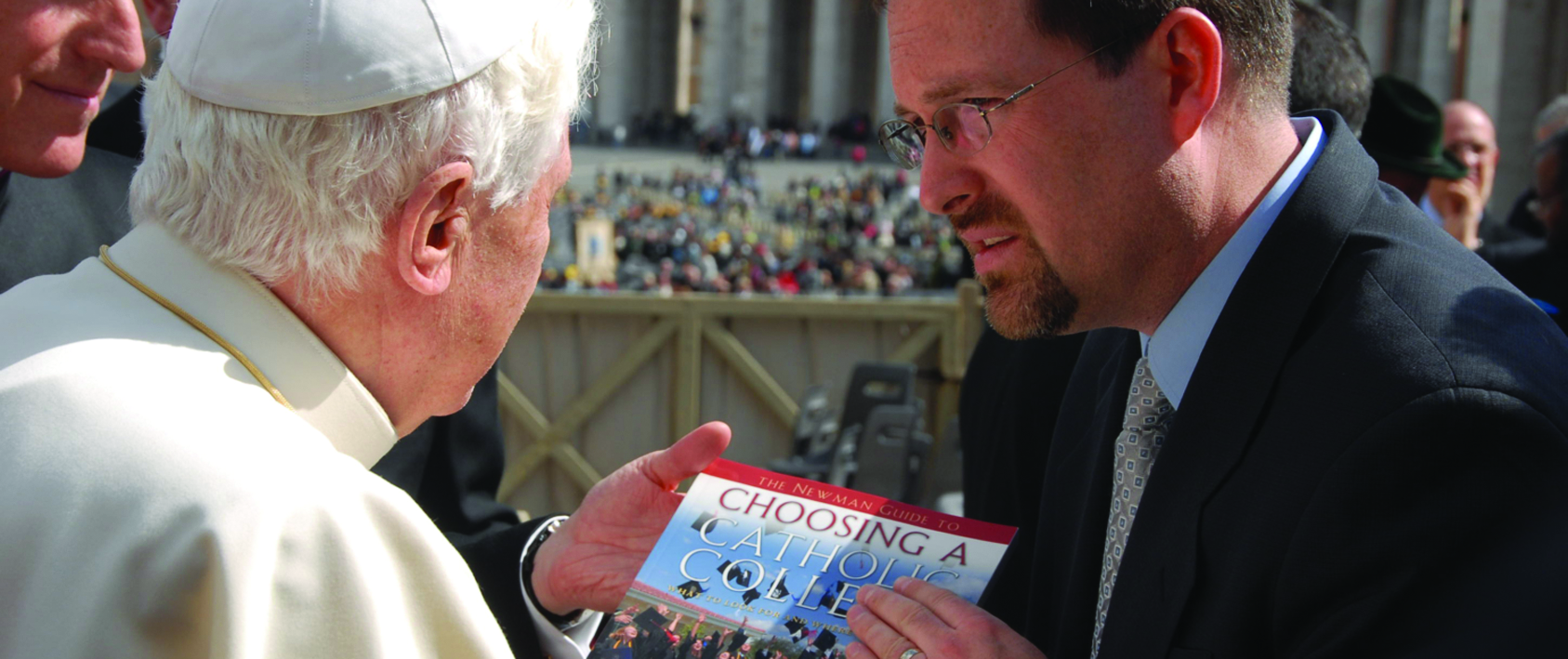Amid the crisis of unbelief, a plan to re-Catechize U.S. Catholics

Patrick Reilly, president and founder of The Cardinal Newman Society, which identifies and celebrates good Catholic education
by Patrick Reilly
In the United States, surveys show a crisis of faith in the Eucharist, especially among young people. Not only do many baptized Catholics not believe in the Real Presence of Christ, but a sizable portion actually think that the Church teaches the Protestant heresy that the Communion Host is but a symbol of Jesus.
This, then, is not primarily a crisis of dissent — it’s a failure of catechesis. The solution lies in education: in the home, from the pulpit, and in Catholic schools, homeschooling and colleges. As part of the U.S. bishops’ three-year “Eucharistic revival” to renew devotion to the Eucharist, educators are rallying to evangelize young Catholics with the truth of the Eucharist, the source and summit of the Catholic faith.
One new initiative is the Task Force for Eucharistic Education, a project of The Cardinal Newman Society to encourage, identify and promote efforts to strengthen Catholic education on the Eucharist. Already many Catholic leaders and institutions across the U.S. have joined the initiative in support of the bishops and as part of the renewal of faithful education, after a decades-long struggle with Catholic identity and formation.
A Crisis of Unbelief
Most young adult Catholics in the U.S. do not believe that the consecrated Eucharist is Christ’s body and blood, according to an October 2021 survey conducted by The Pillar news organization. Still, it is astonishing that only six percent agree that it is “spiritually and morally dangerous” if one receives the Eucharist without “properly preparing yourself.” They simply are not being formed with reverence for the Eucharist, which likely fosters disbelief.

a 2019 survey, conducted by the Pew Research Center, found that 74 percent of Catholics age 18-40 did not believe in the Real Presence of Christ in the Eucharist
A 2019 survey, conducted by the Pew Research Center, found that 74 percent of Catholics age 18-40 did not believe in the Real Presence of Christ in the Eucharist. Rather than outright rejecting Catholic teaching, 64 percent of the unbelievers said they were unsure or unaware of Catholic teaching on the Real Presence, and 62 percent claimed the Church actually teaches that the consecrated wine and bread are merely symbols of Christ.
Clearly America’s young people need better catechesis and better Catholic education — which, when done well, is the Church’s primary and most effective means of evangelization. There are already good models to build upon. Some of the best schools and colleges provide reverent liturgies, Eucharistic adoration and prayer. Some sponsor scholas for sacred music and Eucharistic processions of students and faculty. Teachers share the truth of the Real Presence by both instruction and witness, as reverent participants in Mass and Eucharistic adoration.
Despite the struggles of Catholic schools, which have lost about two-thirds of their enrollment since 1970, authentic Catholic education is the best hope for a Eucharistic revival. Among Millennial Catholics (born 1982 or later) who never attended a Catholic This means not only helping every Catholic family with affordable options for Catholic education but also doing a better job in our homes, schools and colleges to catechize young people and preserve their faith into adulthood. Today’s highly secular culture presents a difficult challenge, but a Catholic education should always be a Eucharistic education.
Building Model Schools
Responding to the crisis of faith, the U.S. bishops’ “Eucharistic revival” features parish activities, Eucharistic adoration and processions, and a national Eucharistic Congress in 2024. But key to the revival’s success will be a renewal of catechesis and devotion to the Eucharist in parochial schools, lay-run schools, homeschooling, hybrid programs and faithful colleges.
During a Cardinal Newman Society meeting in January with Catholic college presidents, Bishop Andrew Cozzens, chairman of the bishops’ revival effort, urged educators to help the bishops promote understanding and love of the Eucharist. The Society has identified four goals for Catholic education:
- a revival of Eucharistic literacy, by teaching students the truth of the Real Presence in the Eucharist;
- a revival of Eucharistic liturgy, by improving liturgical music, prayer, and reverence in Catholic school and college liturgies;
- a revival of Eucharistic devotion, by increasing devotion to the Eucharist among young people through prayer and adoration; and
- a revival of Eucharistic living, by forming students in lifestyles that conform to the reality of Christ within them.
In July, during the international Sacra Liturgia conference hosted this year by San Francisco Archbishop Salvatore Cordileone, The Cardinal Newman Society gathered theologians, liturgical music teachers, and school and college leaders to launch the Task Force for Eucharistic Education. The Society’s role is to identify and celebrate various efforts across Catholic education to advance the four goals of Eucharistic literacy, liturgy, devotion and living. The Task Force website (EucharisticEducation.org) features details on members and their projects, providing educators a clearinghouse of strong ideas for improving education.
Leading Catholics have embraced the program and serve on its steering committee. These include Mary Pat Donoghue, director of the U.S. bishops’ Secretariat for Catholic Education; Lincoln Snyder, president of the National Catholic Educational Association; Michael St. Pierre, director of the Catholic Campus Ministry Association; Robert Royal, president of the Faith and Reason Institute; and Charlie McKinney, president of Sophia Institute Press. Others include school and college leaders and experts in Catholic education.
Already more than two dozen Catholic schools and colleges have joined the Task Force as inaugural members, pledging projects to enhance Eucharistic education. More than half are colleges recognized by The Cardinal Newman Society for their strong fidelity and formation, and others are faithful elementary and secondary schools also recognized by the Society’s Honor Roll program.
Educators collaborating to re-center Catholic education on the Eucharist and sound faith formation for young people is precisely what the Church needs in this time of ignorance and confusion. St. John Paul II in his apostolic exhortation Catechesi Tradendae warned that “sacramental life is impoverished and very soon turns into hollow ritualism if it is not based on serious knowledge of the meaning of the sacraments, and catechesis becomes intellectualized if it fails to come alive in the sacramental practice.”
Today we see both ignorance about the sacraments and lack of reverence among those who confess the Real Presence of Christ. Catholic education is the Church’s best response to this crisis, but it must rediscover its source and life in the Eucharist if it is to recover from its long decline. school, only five percent attend weekly Mass, according to data collected by the Center for Applied Research in the Apostolate. But those numbers climb to 34 percent for those who attended a Catholic primary school and 39 percent if they attended a Catholic high school. Given the weak Catholic identity of many schools in recent decades, a renewal of faithful Catholic education could have a dramatic impact on the Church.
Patrick Reilly is president and founder of The Cardinal Newman Society, which promotes and defends faithful Catholic education
The Cardinal Newman Society: Renewing Through Education
Founded in 1993, The Cardinal Newman Society is a Catholic organization in the United States that promotes and defends faithful Catholic education. It is a standard-bearer for fidelity and truth in Catholic education; a trusted partner for Catholic education leaders who are committed to improving policies and curricula, strengthening Catholic identity, and ensuring faithful teaching; and an ally of Catholic families who need affordable options to ensure the faithful formation of their children.
The Society’s work includes Catholic education leader outreach to promote best practices and standards in Catholic education, general Catholic outreach to promote faithful Catholic education and the Newman Society’s work, and programs to help families choose the best Catholic educational options. The Society is 12perhaps best known for The Newman Guide, which recognizes faithful Catholic colleges, and its Honor Roll program, which recognizes elementary and secondary schools committed to faithful Catholic formation.
“Education is integral to the mission of the Church to proclaim the Good News,” said Pope Benedict XVI in his 2008 address to American Catholic educators. The Cardinal Newman Society believes renewal of the Church in society and a renewal of Christian culture depends on the renewal of faithful Catholic education.







Facebook Comments